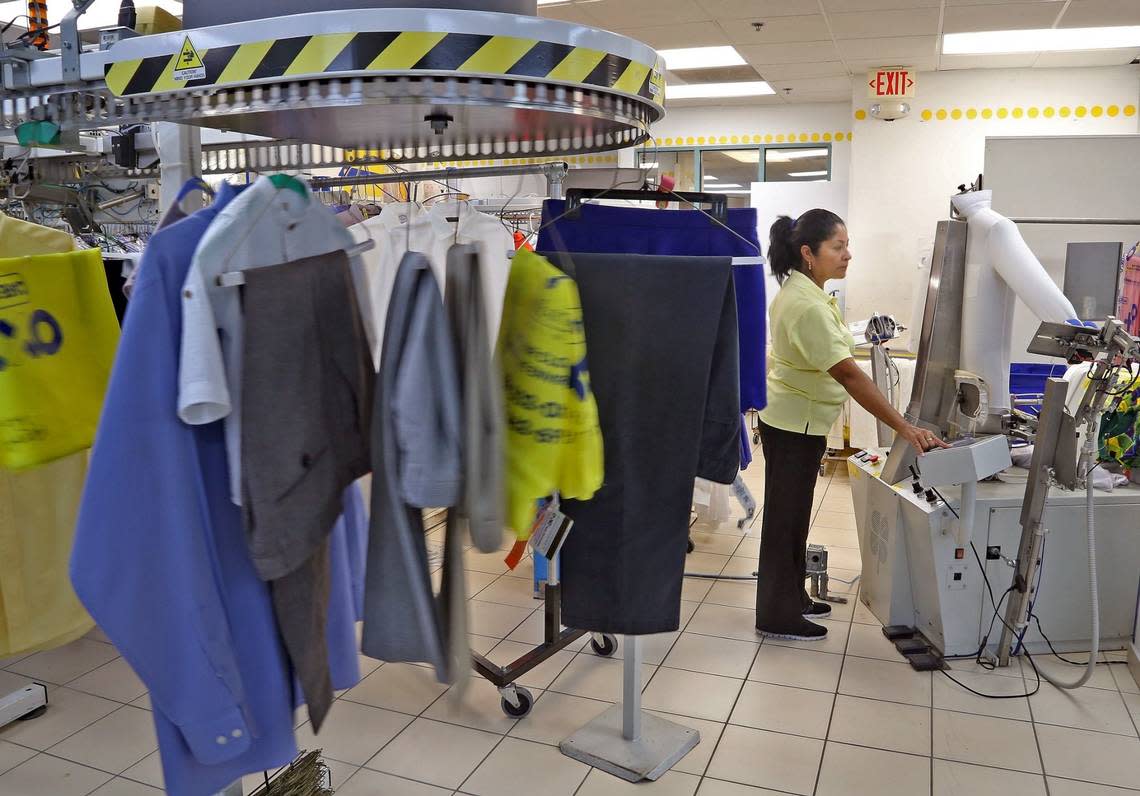Miami Congresswoman kicks mud on new EPA rule that would ban drycleaning chemical

Miami Congresswoman María Elvira Salazar is warning that a new environmental rule proposed by the Biden administration could cause financial problems for the companies that clean, starch and press your clothing.
Salazar is among the Republicans on the House Committee on Small Business who have raised concerns regarding a proposed ban by the Environmental Protection Agency on a chemical widely used by dry cleaners since the 1940s to remove stains from clothing. In a letter sent late last month to the EPA, Salazar and her colleagues pressed for more information and said the agency “may not have properly considered” the consequences for small businesses while proposing the new rule to reduce the use of Perchloroethylene.
“Our small businesses are suffering from overregulation, and the Biden administration seems to not understand the pain,” Salazar said in a press release announcing a June 29 letter to EPA Administrator Michael S. Regan.
Last month, the EPA proposed a ban on all consumer and many commercial uses of Perchloroethylene — including, specifically, dry cleaning — to protect public health. Also known as PCE, the chemical is widely used in the dry cleaner industry to get rid of dirt and other stains. Some dry-cleaning businesses have phased out the chemical, but according to an estimate by the EPA, 6,000 dry cleaners in the United States still use PCE.
According to the EPA, the use of the chemical has generated health concerns particularly for dry cleaning employees who are exposed to PCE. In December 2022, after studying the issue, the EPA released an updated and final risk evaluation, determining that the use of PCE could damage the nervous system, cause cancer, kidney damage, liver, and developmental problems.
The recommended regulation would allow a 10-year phaseout for dry cleaning businesses that still use PCE.
“In developing this proposed rule, EPA consulted with small businesses, industry trade associations, and State and local agencies to better understand the uses of PCE, including in dry cleaning,” an EPA official wrote in a statement to the Miami Herald. “EPA’s Economic Analysis estimates that, at the end of that 10-year period, there will only be about 60 PCE machines still in operation nationwide.”
The EPA’s proposal, however, has received pushback from industry representatives, who say the Biden administration is threatening to create expensive new regulations for businesses that suffered deeply during the pandemic, when travel, business and the need to clean finer clothing all diminished.
Jon Meijer, the director of membership development for the Dryer and Laundry Institute, a trade association of dry cleaning professionals, warned that a proposed 10-year phaseout would hit dry cleaners that only recently purchased new machines that use PCE.
“A 10-year phaseout would not allow cleaners that recently purchased a new Perchloroethylene machine to fully utilize that equipment,” he said.
In President Joe Biden’s 2024 budget request, he proposed pollution prevention grants for small businesses. If passed, this budget request could potentially provide money to drycleaning businesses making the transition away from the use of PCE.
Republicans’ warnings about changes to the dry cleaning industry come on the heels of a somewhat similar controversy, in which the GOP warned that a member of the federal government’s Consumer Product Safety Commission had floated banning gas stoves. The White House has said it has no plans to push that agenda, but last month House Republicans voted to hamstring the Commission’s ability to regulate gas stoves.
Republicans on the House Committee on Small Business gave the EPA until Thursday July 13 to respond to their letter. According to Salazar’s office the EPA acknowledged the receipt of the letter but offered no response.
The EPA will hold a public webinar at 1 PM on Wednesday, July 19. “EPA is particularly looking for participation from employers and workers who can give perspective on the feasibility and efficacy of the proposed requirement for worker protections,” said the EPA in its response.

